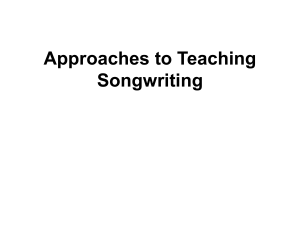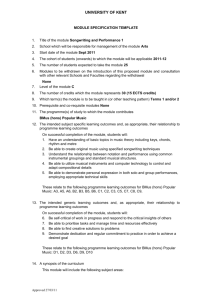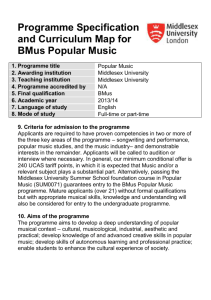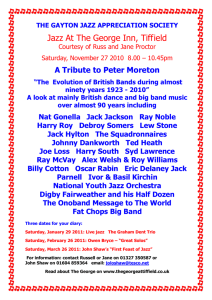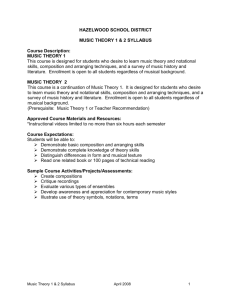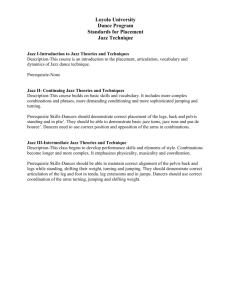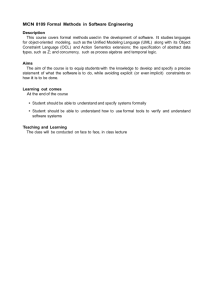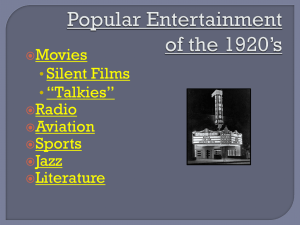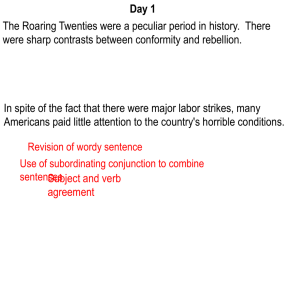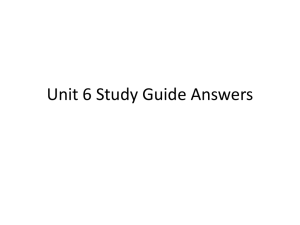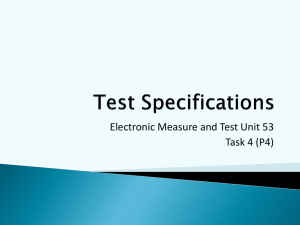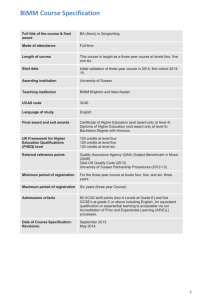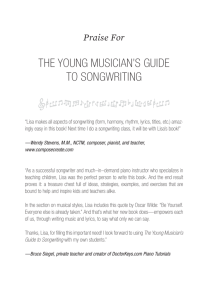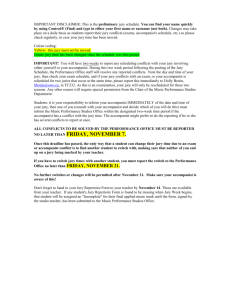Rawlins, R. (2005) Jazzology: The
advertisement
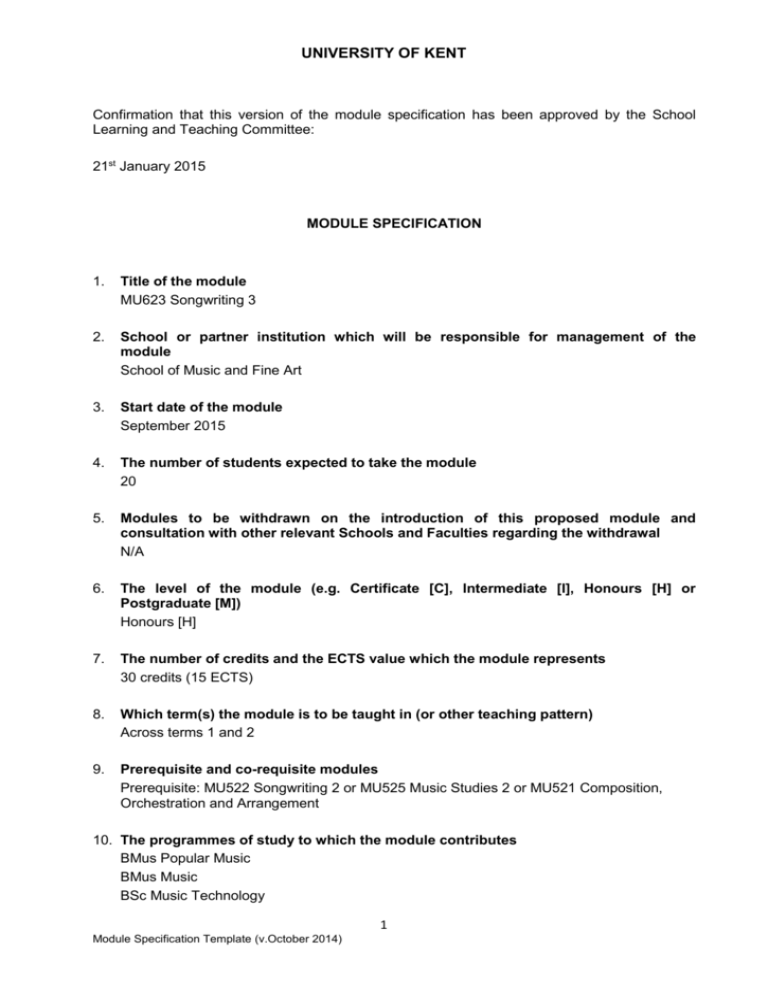
UNIVERSITY OF KENT Confirmation that this version of the module specification has been approved by the School Learning and Teaching Committee: 21st January 2015 MODULE SPECIFICATION 1. Title of the module MU623 Songwriting 3 2. School or partner institution which will be responsible for management of the module School of Music and Fine Art 3. Start date of the module September 2015 4. The number of students expected to take the module 20 5. Modules to be withdrawn on the introduction of this proposed module and consultation with other relevant Schools and Faculties regarding the withdrawal N/A 6. The level of the module (e.g. Certificate [C], Intermediate [I], Honours [H] or Postgraduate [M]) Honours [H] 7. The number of credits and the ECTS value which the module represents 30 credits (15 ECTS) 8. Which term(s) the module is to be taught in (or other teaching pattern) Across terms 1 and 2 9. Prerequisite and co-requisite modules Prerequisite: MU522 Songwriting 2 or MU525 Music Studies 2 or MU521 Composition, Orchestration and Arrangement 10. The programmes of study to which the module contributes BMus Popular Music BMus Music BSc Music Technology 1 Module Specification Template (v.October 2014) UNIVERSITY OF KENT 11. The intended subject specific learning outcomes On successfully completing the module students will: 1) Have a detailed understanding of advanced technical concepts in writing and arranging popular music. 2) Have an awareness of advanced topics in music theory in areas such as tonality/modality, harmony and rhythm through the composition of sophisticated songs. 3) Be able to create original music using advanced songwriting techniques, shaping intricate details of a composition and demonstrating advanced levels of judgement pertaining to industry practices. 4) Be able to utilize musical instruments and related musical technologies to develop sophisticated musical material that demonstrates a strong grasp of style, genre and production conventions within the music industry. 12. The intended generic learning outcomes On successfully completing the module students will: 1) Be able to use Information Technology in the preparation of work. 2) Be self-critical of work in progress, responding to the critical insights of others in order to develop a final piece of work. 3) Be able to prioritise tasks and manage time and resources effectively. 13. A synopsis of the curriculum This module develops further the skills and understanding fostered in MU522 Songwriting 2. Students develop further their understanding of the advanced harmonic and melodic processes found in popular music, such as: modal and chromatic chord substitutions, chromatic contrapuntal devices, and approaches to key centre ambiguity. Students will analyse some of the most sophisticated songs and styles in the repertoire. Examples will be taken from within and outside the ‘mainstream’ of popular music, in order to help students develop a greater flexibility in their approach to the discipline. Students will also develop a systematic approach to arrangement taking careful account of conventions pertaining to genre distinctions in the music industry. 14. Indicative Reading List Capuzzo, G. (2004) ‘Neo-Riemannian Theory and the Analysis of Pop-Rock Music’. Music Theory Spectrum 26 (2), pp. 177–200. Levine, M. (1995) The Jazz Theory Book. Petaluma: Sher. Please, F. (2001) Modern Jazz Voicings: Arranging for Small and Medium Ensembles, Boston. Mass: Berklee Press. Rawlins, R. (2005) Jazzology: The Encyclopaedia of Jazz Theory. Milwaukee: Hal Leonard. Tymoczko, D (2010) A Geometry of Music: Harmony and Counterpoint in the Extended Common Practice. New York: Oxford University Press 2 Module Specification Template (v.October 2014) UNIVERSITY OF KENT 15. Learning and Teaching Methods, including the nature and number of contact hours and the total study hours which will be expected of students, and how these relate to achievement of the intended module learning outcomes Total Contact Hours: Independent Study Hours: Total Study Hours: 40 260 300 Delivery of this module is by lectures, demonstrations and practical workshops and group musical activities (Learning outcomes 11.1, 11.2, 11.3, 11.4, 12.1, 12.2 and 12.3). The total workload is 300 hours including a 1 hour lecture and a 1 hour workshop per week over two terms. Instrumental and vocal practice is likely to be an important part of this module, when students develop their songwriting and arranging ideas in practical workshops. In addition to this, students are expected to supplement lectures by researching recent scholarship in popular music harmony including jazz harmony and guides to orchestration and pop and jazz arranging using the recommended reading. 16. Assessment methods and how these relate to testing achievement of the intended module learning outcomes Songwriting Portfolio, that draws upon two or more popular music genres and styles: 80% (11.1, 11.2, 11.3, 11.4, 12.1, 12.2, 12.3) Written Commentary, 1500 words: 20% (11.2 and 12.3) 17. Implications for learning resources, including staff, library, IT and space Resources for this module are in currently in place. 18. The School recognises and has embedded the expectations of current disability equality legislation, and supports students with a declared disability or special educational need in its teaching. Within this module we will make reasonable adjustments wherever necessary, including additional or substitute materials, teaching modes or assessment methods for students who have declared and discussed their learning support needs. Arrangements for students with declared disabilities will be made on an individual basis, in consultation with the University’s disability/dyslexia support service, and specialist support will be provided where needed. 19. Campus(es) or Centre(s) where module will be delivered: Medway 3 Module Specification Template (v.October 2014)
